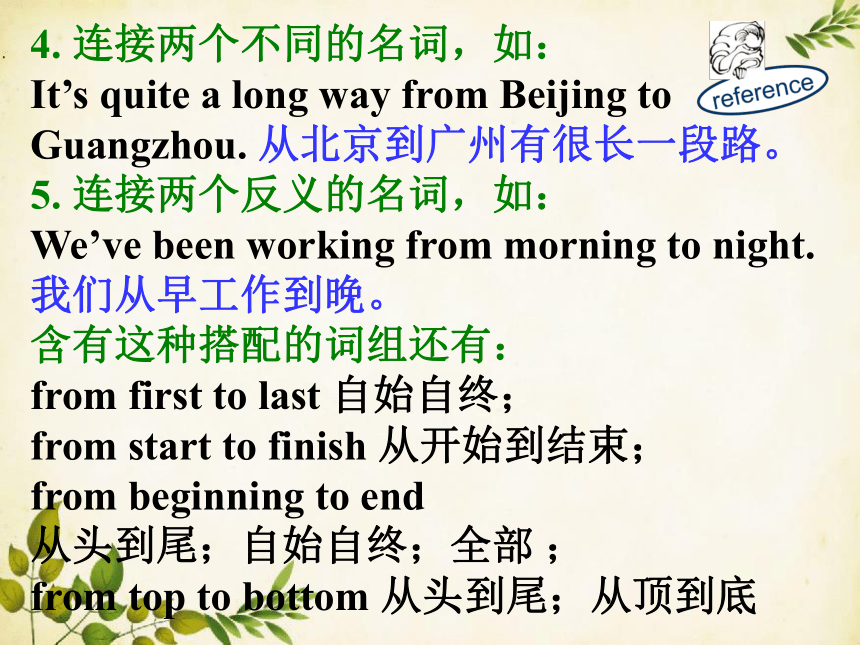牛津译林版英语九年级上册Unit 6 TV programmes Grammar课件(42张PPT)
文档属性
| 名称 | 牛津译林版英语九年级上册Unit 6 TV programmes Grammar课件(42张PPT) |  | |
| 格式 | ppt | ||
| 文件大小 | 1.7MB | ||
| 资源类型 | 教案 | ||
| 版本资源 | 牛津译林版 | ||
| 科目 | 英语 | ||
| 更新时间 | 2023-07-26 14:39:35 | ||
图片预览












文档简介
(共42张PPT)
Grammar
牛津译林版九年级英语上册
Unit 6
TV programmes
Grammar A and B
Prepositional phrases of time: ‘between … and …’ and ‘from … to…’
Using ‘before’, ‘after’, and ‘until’
Use ‘between … and …’ and ‘from … to …’ to specify periods of time
You can come between 8 and 9.
你可以在8点和9点之间来。
The nursery is open to children from 2 to 6 years old.
这所幼儿园对2岁到6岁之间的儿童开放。
between … and …
一、在两者之间;在……中间:
1. 指时间:
It was between 1830 and 1835 that the modern newspaper was born.
现代报纸的诞生是在1830—1835年间。
2. 指空间:
I dropped it between my house and the station. 这东西掉在了我家和车站之间。
二、在两两之间,其意义接近among:
The women volleyball match on March 8 will be held between China, the U.S.A., and Cuba.
三月八日的女子排球赛将在中国、美国、日本和古巴四国之间举行。
三、来往于……之间:
The ship sails between Shanghai and Tianjin.
这艘船来往于上海和天津之间。
四、由于……共同作用的结果:
Between astonishment and joy, she could hardly say a word.
由于惊喜交集,她几乎说不出一句话。
五、用于习语:
between ourselves [you and me] 仅你我知道的秘密。如:
Between you and me, he’s not very reliable.
这是只有你我之间才说,他不是很可靠。
from … to …
1. 连接两个不同的数词,如:
Can you count from one to a hundred
你能从一数到一百吗?
2. 接两个不同的数字,用于复数名词前,如:
The work should take us from two to three hours.
这工作要用去我们2至3小时。
3. 连接两个相同的名词,如:
The paper was passed from hand to hand. 这份文件从一个人手里传到另一个手里。
含有这种搭配的词组还有:
from day to day 日复一日地;
from door to door 挨门挨户地;
from house to house 挨家挨户地;
from place to place
从一个地方到另一个地方;处处
from side to side 从一边到另一边;
from time to time 不时地;有时
4. 连接两个不同的名词,如:
It’s quite a long way from Beijing to Guangzhou. 从北京到广州有很长一段路。
5. 连接两个反义的名词,如:
We’ve been working from morning to night.
我们从早工作到晚。
含有这种搭配的词组还有:
from first to last 自始自终;
from start to finish 从开始到结束;
from beginning to end
从头到尾;自始自终;全部 ;
from top to bottom 从头到尾;从顶到底
6. 连接被one修饰的名词和表示其他的不定代词,如:
We can use horses to carry things from one place to another. 我们可以用马把东西从一个地方驮到另一个地方。
7. 连接one和another两个不定代词,如:
They passed the coin from one to another.他们把硬币从一个人传到另一个人。
8. 连接两个不同的地点副词,如:
It’s only two hundred metres from here to there. 从这里到那里仅有两百米远。
9. 接表示地点的副词和名词,如:
It’s only two hundred metres from here to my home. 从这里到我家仅有两百米远。
10. 连接两个不同的形容词,如:
In autumn the leaves change from green to brown. 秋天树叶由绿色变为褐色。
11. 连接一个形容词及其比较级,如:
Her Chinese is going from bad to worse. 她的语文越来越差。
用适当的介词填空:
1. There is no secret _______ you and me.
2. People can make a call _______ countries in English.
3. The cat is ______ the door, so you can’t see it.
4. The children ask for candies _____ house __ house at Halloween.
between
between
behind
from
to
5. Don’t read __ the sun. It’s bad for your eyes.
6. We have no lessons _______ 3:50 p.m. and 4:50 p.m. every day.
7. There is a lot of news __ today’s newspaper.
8. Can you swim __ the river
in
between
in
in
Use ‘before’, ‘after’ and ‘until’ to indicate time sequence.
after
until
at an earlier time than
at a later time than
up to the time that
before
Look and say
Sam gets up at 7:30 a.m. ______ he goes to school he has breakfast. Lessons start at 8:00 a.m. He won’t have lunch ____ 12:00. _____ school, around 4:50 p.m. he goes home. In the evening he watches TV for half an hour ______ he has supper. _____ that he does his homework. He won’t go to bed _____ 9:00.
Before
until
before
After
After
until
Fill in the blanks.
Use ‘before’, ‘after’ and ‘until’ to talk about your school life or family life.
Practice
Grammar C and D
Using ‘while’ and ‘as’
Comparative and superlative adverbs
‘While’ and ‘as’ are also conjunctions of time. Both ‘while’ and ‘as’ mean ‘during the time that’.
long action
While
long action
short action
While
long action
short action
As
long action
short action
As
short action
‘while’, ‘as’
这两个连词都可引导时间状语从句,但用法有所不同。
当某事正在进行的时候,又发生了另 一件事。While, as 都可用来引导表示 “背景”的时间状语从句。
As/While I was walking down the street I noticed a police car.
2) 当两个长动作同时进行的时候,常用的是while。
While mother was cooking lunch, I was doing my homework.
3) 当两个动作都表示发展变化的情况时,最常用的是as。
As children get older, they become more and more interested in things around them.
4) 当两个短动作同时发生时,或表示“一边……一边……”时,最常用as。
Just as he caught the fly, he gave a loud cry.
She looked behind from time to time as she went.
我父亲在看报纸时睡着了。
My father fell asleep while/as he was reading the newspaper.
2. 妈妈做晚饭的时候,我在做作业。
While Mum was cooking dinner, I was doing my homework.
3. 她沿着那条路走着,心里想着她父亲。
As she walked along the road, she thought about her father.
Translate the following sentences:
词尾变化 原级 比较级 最高级
单音节词在词尾加-er(比较级)或-est(最高级);以字母e接尾的词加-r或-st hard high fast
harder higher faster
hardest highest fastest
Comparative and superlative adverbs
词尾变化 原级 比较级 最高级
多音节词和多数双音节词在其前面加more和most slowly carefully
quickly
more slowly
more carefully
more quickly
most slowly
most carefully
most quickly
词尾变化 原级 比较级 最高级
不规则
变化 well
much
little
badly
far
early-earlier-earliest
better more less
worse farther
best
most
least worst
farthest
副词的比较级和最高级的常用结构:
as+副词原级+as 意为“与… …一样”,表示同级比较
她歌唱得像天使一样甜。
She sings as sweetly as an angel.
2. 我一小时能跑30英里。
I can run as fast as 30 miles an hour.
副词比较级+than 意为“比……更……”,
表示两者之间的比较
1. 本比他那个懒爸爸起床早。
Ben gets up earlier than his lazy father.
2. 他们现在比以前过的更幸福。
They now live more happily than before.
雨下得越来越大。
It rained more and more heavily.
2. 你学习越来越努力了。
You study harder and harder.
副词比较级+副词比较级,意为“越来越……”
the+副词的比较级,the+副词的比较级,意为“越……就越……”
我看到她越多,我越不喜欢她。
The more I see her, the less I like her.
他打字打得越快,他出的错就越多。
The faster he types, the more mistakes he will make.
(the)+副词的最高级+比较范围(三者或三者以上),意为“最……”
亨利是所有运动员中跳的最高的。
Henry jumps highest of all the athletes.
他在班上学习最用功。
He works hardest in his class.
使用这种结构时我们应该注意,形容词的最高级前面一般说来要加用定冠词the,而副词的最高级前面的定冠词往往可以省略。
between … and, from … to, between, from, before, after, until, while, as
I won’t go to bed _____ my mother comes back.
2. You may come to my office _______ 9:00 a.m. ____ 11:30 a.m. tomorrow.
until
I. 选词填空
between
and
3. We go to school _____ Monday ___ Saturday.
4. It will be a long time ______ we finish this dictionary.
5. _____ I saw the kangaroo, I never knew an animal can jump so high.
6. I’ll play badminton with you ____ I finished my homework.
from
to
before
Until
after
7. You should knock on the door ______ you come in.
8. Can you watch TV _____ 8:00 a.m. to 9:30 a.m.
9. ___ the tiger came, all the animals ran away.
10. How can you know the ending
______ you read the book
before
from
As
before
11. Can I stay _____ the weekend
12. ________ I was doing my homework,
I heard a strange noise downstairs.
13. Sandy was reading the newspaper, _____ Millie was watching TV.
14. We must finish it _______ 8:00 p.m.
and 11:00 p.m. Come on! We don’t
have much time.
until
While/As
while
between
1. She sang even _____ (bad) than usual.
2. Mother asked her son to walk a bit _____ (fast).
3. Of all the novels I like this one ____ (well).
4. Who do you think can jump _______ (high) in your class
worse
faster
best
highest
II. 用所给词的正确形式填空。
5. Please send us the technical data as ______ (quick) as possible.
6. He should speak ____ (little) and listen _____ (much).
7. Please tell them not to play so ______ (noisy).
quickly
less
more
noisily
1. 我们一直走到河边为止。
2. 吃饭前先洗手。
III. Translate the following sentences.
We walked until we got to the river.
Wash your hands before you have
meals.
3. 在他油漆了窗户之后,开始油漆门。
4. 他到十岁才会游泳。
5. 他在过马路前向两边看了看。
After he painted the windows,
he painted the doors.
He couldn’t swim until he was ten.
He looked both ways before he
crossed the road.
Review the Grammar.
Finish the exercises on P69, P70, P72 and P73.
Grammar
牛津译林版九年级英语上册
Unit 6
TV programmes
Grammar A and B
Prepositional phrases of time: ‘between … and …’ and ‘from … to…’
Using ‘before’, ‘after’, and ‘until’
Use ‘between … and …’ and ‘from … to …’ to specify periods of time
You can come between 8 and 9.
你可以在8点和9点之间来。
The nursery is open to children from 2 to 6 years old.
这所幼儿园对2岁到6岁之间的儿童开放。
between … and …
一、在两者之间;在……中间:
1. 指时间:
It was between 1830 and 1835 that the modern newspaper was born.
现代报纸的诞生是在1830—1835年间。
2. 指空间:
I dropped it between my house and the station. 这东西掉在了我家和车站之间。
二、在两两之间,其意义接近among:
The women volleyball match on March 8 will be held between China, the U.S.A., and Cuba.
三月八日的女子排球赛将在中国、美国、日本和古巴四国之间举行。
三、来往于……之间:
The ship sails between Shanghai and Tianjin.
这艘船来往于上海和天津之间。
四、由于……共同作用的结果:
Between astonishment and joy, she could hardly say a word.
由于惊喜交集,她几乎说不出一句话。
五、用于习语:
between ourselves [you and me] 仅你我知道的秘密。如:
Between you and me, he’s not very reliable.
这是只有你我之间才说,他不是很可靠。
from … to …
1. 连接两个不同的数词,如:
Can you count from one to a hundred
你能从一数到一百吗?
2. 接两个不同的数字,用于复数名词前,如:
The work should take us from two to three hours.
这工作要用去我们2至3小时。
3. 连接两个相同的名词,如:
The paper was passed from hand to hand. 这份文件从一个人手里传到另一个手里。
含有这种搭配的词组还有:
from day to day 日复一日地;
from door to door 挨门挨户地;
from house to house 挨家挨户地;
from place to place
从一个地方到另一个地方;处处
from side to side 从一边到另一边;
from time to time 不时地;有时
4. 连接两个不同的名词,如:
It’s quite a long way from Beijing to Guangzhou. 从北京到广州有很长一段路。
5. 连接两个反义的名词,如:
We’ve been working from morning to night.
我们从早工作到晚。
含有这种搭配的词组还有:
from first to last 自始自终;
from start to finish 从开始到结束;
from beginning to end
从头到尾;自始自终;全部 ;
from top to bottom 从头到尾;从顶到底
6. 连接被one修饰的名词和表示其他的不定代词,如:
We can use horses to carry things from one place to another. 我们可以用马把东西从一个地方驮到另一个地方。
7. 连接one和another两个不定代词,如:
They passed the coin from one to another.他们把硬币从一个人传到另一个人。
8. 连接两个不同的地点副词,如:
It’s only two hundred metres from here to there. 从这里到那里仅有两百米远。
9. 接表示地点的副词和名词,如:
It’s only two hundred metres from here to my home. 从这里到我家仅有两百米远。
10. 连接两个不同的形容词,如:
In autumn the leaves change from green to brown. 秋天树叶由绿色变为褐色。
11. 连接一个形容词及其比较级,如:
Her Chinese is going from bad to worse. 她的语文越来越差。
用适当的介词填空:
1. There is no secret _______ you and me.
2. People can make a call _______ countries in English.
3. The cat is ______ the door, so you can’t see it.
4. The children ask for candies _____ house __ house at Halloween.
between
between
behind
from
to
5. Don’t read __ the sun. It’s bad for your eyes.
6. We have no lessons _______ 3:50 p.m. and 4:50 p.m. every day.
7. There is a lot of news __ today’s newspaper.
8. Can you swim __ the river
in
between
in
in
Use ‘before’, ‘after’ and ‘until’ to indicate time sequence.
after
until
at an earlier time than
at a later time than
up to the time that
before
Look and say
Sam gets up at 7:30 a.m. ______ he goes to school he has breakfast. Lessons start at 8:00 a.m. He won’t have lunch ____ 12:00. _____ school, around 4:50 p.m. he goes home. In the evening he watches TV for half an hour ______ he has supper. _____ that he does his homework. He won’t go to bed _____ 9:00.
Before
until
before
After
After
until
Fill in the blanks.
Use ‘before’, ‘after’ and ‘until’ to talk about your school life or family life.
Practice
Grammar C and D
Using ‘while’ and ‘as’
Comparative and superlative adverbs
‘While’ and ‘as’ are also conjunctions of time. Both ‘while’ and ‘as’ mean ‘during the time that’.
long action
While
long action
short action
While
long action
short action
As
long action
short action
As
short action
‘while’, ‘as’
这两个连词都可引导时间状语从句,但用法有所不同。
当某事正在进行的时候,又发生了另 一件事。While, as 都可用来引导表示 “背景”的时间状语从句。
As/While I was walking down the street I noticed a police car.
2) 当两个长动作同时进行的时候,常用的是while。
While mother was cooking lunch, I was doing my homework.
3) 当两个动作都表示发展变化的情况时,最常用的是as。
As children get older, they become more and more interested in things around them.
4) 当两个短动作同时发生时,或表示“一边……一边……”时,最常用as。
Just as he caught the fly, he gave a loud cry.
She looked behind from time to time as she went.
我父亲在看报纸时睡着了。
My father fell asleep while/as he was reading the newspaper.
2. 妈妈做晚饭的时候,我在做作业。
While Mum was cooking dinner, I was doing my homework.
3. 她沿着那条路走着,心里想着她父亲。
As she walked along the road, she thought about her father.
Translate the following sentences:
词尾变化 原级 比较级 最高级
单音节词在词尾加-er(比较级)或-est(最高级);以字母e接尾的词加-r或-st hard high fast
harder higher faster
hardest highest fastest
Comparative and superlative adverbs
词尾变化 原级 比较级 最高级
多音节词和多数双音节词在其前面加more和most slowly carefully
quickly
more slowly
more carefully
more quickly
most slowly
most carefully
most quickly
词尾变化 原级 比较级 最高级
不规则
变化 well
much
little
badly
far
early-earlier-earliest
better more less
worse farther
best
most
least worst
farthest
副词的比较级和最高级的常用结构:
as+副词原级+as 意为“与… …一样”,表示同级比较
她歌唱得像天使一样甜。
She sings as sweetly as an angel.
2. 我一小时能跑30英里。
I can run as fast as 30 miles an hour.
副词比较级+than 意为“比……更……”,
表示两者之间的比较
1. 本比他那个懒爸爸起床早。
Ben gets up earlier than his lazy father.
2. 他们现在比以前过的更幸福。
They now live more happily than before.
雨下得越来越大。
It rained more and more heavily.
2. 你学习越来越努力了。
You study harder and harder.
副词比较级+副词比较级,意为“越来越……”
the+副词的比较级,the+副词的比较级,意为“越……就越……”
我看到她越多,我越不喜欢她。
The more I see her, the less I like her.
他打字打得越快,他出的错就越多。
The faster he types, the more mistakes he will make.
(the)+副词的最高级+比较范围(三者或三者以上),意为“最……”
亨利是所有运动员中跳的最高的。
Henry jumps highest of all the athletes.
他在班上学习最用功。
He works hardest in his class.
使用这种结构时我们应该注意,形容词的最高级前面一般说来要加用定冠词the,而副词的最高级前面的定冠词往往可以省略。
between … and, from … to, between, from, before, after, until, while, as
I won’t go to bed _____ my mother comes back.
2. You may come to my office _______ 9:00 a.m. ____ 11:30 a.m. tomorrow.
until
I. 选词填空
between
and
3. We go to school _____ Monday ___ Saturday.
4. It will be a long time ______ we finish this dictionary.
5. _____ I saw the kangaroo, I never knew an animal can jump so high.
6. I’ll play badminton with you ____ I finished my homework.
from
to
before
Until
after
7. You should knock on the door ______ you come in.
8. Can you watch TV _____ 8:00 a.m. to 9:30 a.m.
9. ___ the tiger came, all the animals ran away.
10. How can you know the ending
______ you read the book
before
from
As
before
11. Can I stay _____ the weekend
12. ________ I was doing my homework,
I heard a strange noise downstairs.
13. Sandy was reading the newspaper, _____ Millie was watching TV.
14. We must finish it _______ 8:00 p.m.
and 11:00 p.m. Come on! We don’t
have much time.
until
While/As
while
between
1. She sang even _____ (bad) than usual.
2. Mother asked her son to walk a bit _____ (fast).
3. Of all the novels I like this one ____ (well).
4. Who do you think can jump _______ (high) in your class
worse
faster
best
highest
II. 用所给词的正确形式填空。
5. Please send us the technical data as ______ (quick) as possible.
6. He should speak ____ (little) and listen _____ (much).
7. Please tell them not to play so ______ (noisy).
quickly
less
more
noisily
1. 我们一直走到河边为止。
2. 吃饭前先洗手。
III. Translate the following sentences.
We walked until we got to the river.
Wash your hands before you have
meals.
3. 在他油漆了窗户之后,开始油漆门。
4. 他到十岁才会游泳。
5. 他在过马路前向两边看了看。
After he painted the windows,
he painted the doors.
He couldn’t swim until he was ten.
He looked both ways before he
crossed the road.
Review the Grammar.
Finish the exercises on P69, P70, P72 and P73.
